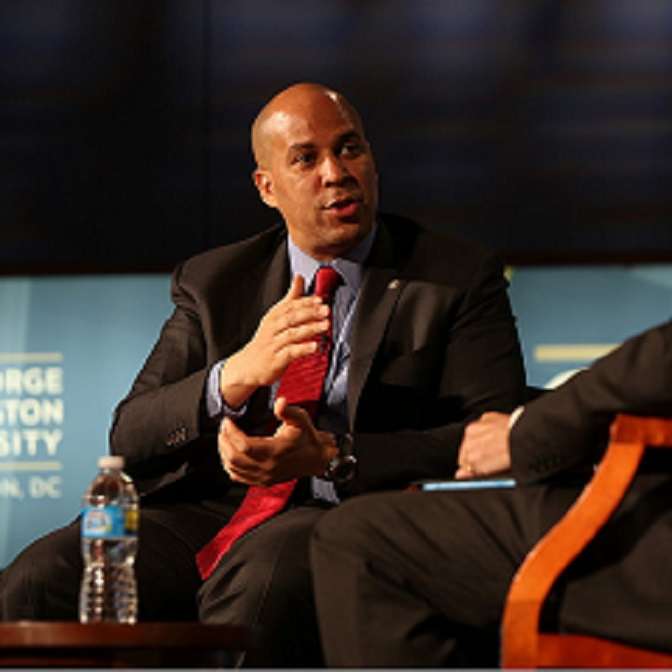The Volokh Conspiracy
Mostly law professors | Sometimes contrarian | Often libertarian | Always independent
Thoughts on the Kavanaugh Racial Profiling Emails Revealed by Sen. Cory Booker
Conservative support for racial profiling is deeply problematic. But the e-mail leaked by Sen. Cory Booker actually shows Brett Kavanaugh advocating "race-neutral" post-9/11 security policies.

The big supposed bombshell of this morning's Senate confirmation hearing for Supreme Court nominee Brett Kavanaugh was Democratic Senator Cory Booker's release of a series of e-mails on racial profiling in post-9/11 security policy that Kavanaugh wrote in 2001-2002, while he was working in the George W. Bush White House. Booker leaked the e-mails even though they were marked "committee confidential," and therefore not supposed to be released to the public. He stated that he would release the e-mails despite the potential risk of punishment, including even potential exclusion from the Senate.
I think Booker was right to suggest that this e-mail chain should never have been withheld from the public in the first place. There is no classified national security information there, or anything else that, as far as I can tell, needs to be kept secret. Terrorists did not need these e-mails to figure out that the use of racial profiling was considered as a possible tactic in the aftermath of the 9/11 attacks. More generally, Booker and other Democrats have good reason to suggest that the decisions on which documents to release should have been handled by a neutral body, not by former Bush Administration official Bill Burck, who is also a lawyer for several prominent figures associated with the Trump administration.
Substantively, however, the e-mails don't seem to be a major damaging revelation. If anything the contents should be reassuring to critics of racial profiling, myself included.
In the most notable e-mail in the sequence, Kavanaugh wrote the following:
The people who favor some use of race/nat[ional] origin obviously do not need to grapple with the "interim" question. But the people (such as you and I) who generally favor effective security measures that are race-neutral in fact DO need to grapple -- and grapple now -- with the interim question of what to do before a truly effective and comprehensive race-neutral system is developed and implemented.
The e-mail is part of an exchange betwen different Bush administration officials, some of whom apparently favored the use of racial and ethnic profiling in post-9/11 security policy, and others who opposed it. Kavanaugh quite clearly includes himself in the latter camp. He did, potentially, leave open the possibility that there might be racial profiling in a temporary "interim" policy. That is problematic, but somewhat understandable in the hectic, fearful atmosphere of the immediate post-9/11 period. The e-mail in question was written on January 17, 2002, just four months after the 9/11 attack.
Few mainstream judges and legal scholars contend that the government should abjure racial classifications in every conceivable situation, no matter what. A tightly limited, short-term "interim" policy might pass even the rigorous "strict scrutiny" standard the Supreme Court imposes on governmnt policies that discriminate on the basis of race and ethnicity.
What is most notable here is that Kavanaugh did not favor the routine, institutionalized use of racial profiling, which was apparently supported by some others in the administration. Had the e-mails revealed that Kavanaugh was an advocate of routine racial profiling, I think that would have been a serious strike against him as a Supreme Court nominee. But the messages revealed by Booker actually suggest the exact opposite.
I have long argued that racial profiling in law enforcement is both unjust and unconstitutional (e.g. here, here, and here), and that conservatives who support it are undermining the ideal of color-blindness in government policy that they claim to espouse elsewhere. The policy is also counterproductive in that it predictably poisons the relationship between law enforcement agencies and minority communities - the very people whose coooperation is often essential to effectively combat criminals and terrorists. See also this critique of racial profiling by my George Mason University colleague and prominent conservative legal scholar Nelson Lund. I take the issue of racial profiling very seriously, and I would not want a Supreme Court justice who gives law enforcement agencies a blank check in this field.
The e-mails revealed by Booker provide only a partial window into Judge Kavanaugh's thinking on this subject. But what we do have indicates that he strongly prefers "race-neutral" law enforcement policies. If Booker and other senators have material showing that Kavanaugh actually does support racial profiling, I hope they reveal it. But what has been released so far strikes me as far more reassuring than not.
UPDATE: Bill Burck has issued a statement condemning Booker's "histrionics" and claiming that the revelation by Booker does not violate Senate rules because the e-mails in question were cleared for public release by Burck's staff last night (at Booker's request). If so, there was no violation of Senate rules here (despite Booker's own statement that he was "knowingly" violating the rules by releasing the e-mails), though it is still the case that this material should never have been classified "committee confidential" in the first place.


Show Comments (117)